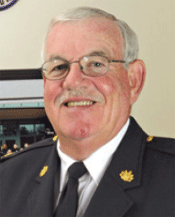 The last year has been challenging, exciting, and rewarding from both a personal and professional perspective. The opportunity to serve as the IACP president has been one of the highlights of my law enforcement career.
The last year has been challenging, exciting, and rewarding from both a personal and professional perspective. The opportunity to serve as the IACP president has been one of the highlights of my law enforcement career.
I am proud that over the last year, the IACP has continued its long tradition of leadership in professional policing by providing law enforcement executives with the tools, information, and programs that they need to succeed.
I would like to draw your attention to a few of the many highlights of this year and urge you to visit www.theiacp.org for information on the numerous other projects currently under way at the IACP.
Center for the Prevention of Violence Against the Police
In my inaugural remarks at the 2009 IACP conference in Denver, I outlined one of the top priorities of my term: my commitment to safeguarding the lives of each and every law enforcement officer. To that end, I am proud to report that the IACP has launched the Center for the Prevention of Violence Against the Police.
The center will gather comprehensive data on officer assaults and other acts of violence from state, local, and tribal law enforcement agencies in the United States and other agencies around the world. Center staff will then analyze that data to provide meaningful, lifesaving information and direction to the field on how to minimize officer injury and death. The essential role of the center will be to enhance the safety of all officers by examining solid data related to violent encounters.
Border Summit
The IACP was an active participant in the 2010 Border Summit hosted by the city of Laredo, Texas, and cosponsored by the Texas Association of Chiefs of Police. The summit shined a spotlight on the many challenges that law enforcement agencies confront on a daily basis along the southwestern border that separates the United States and Mexico.
During two days of discussion, participants identified several key steps that should and must be taken to address the serious national security issue that the southwestern border presents to the United States. These recommendations will guide the IACP’s efforts to address the many challenges that law enforcement agencies along the border continuously face.
Global Policing Summit
In September, the IACP hosted its first ever global policing summit in Paris, France, focusing on the growing rate of youth recruitment by terrorist organizations in countries throughout the world. The global law enforcement community is alarmed and greatly concerned by the growing violence, economic power, and systematic indoctrination of our youth by criminal organizations and terrorist groups.
The summit allowed the IACP to hear from all corners of the world and provided a forum for a powerful exchange of ideas and best practices on this critical topic. A report from this summit will be available in the coming months.
Law Enforcement and Technology
This past summer, I convened the Ad Hoc Committee on Effective Communication in Law Enforcement to discuss the role of personal communication skills and the increasing dependence on technology in our profession. This reliance on technology, coupled with other factors that threaten to separate officers from citizens, has raised concerns among seasoned law enforcement executives that the core communications skills required of police officers have diminished. Interviewing skills, report writing, and testifying in court are a few of the skills that may be eroding.
The committee was in unanimous agreement that this is a very real, but not new, problem that could have a serious impact on police effectiveness if not addressed. Technology is vital to policing, but professional policing requires both effective personal communication skills and the use of technology. The committee’s mission is to find an appropriate balance between the two to prevent the erosion of police effectiveness. Over the coming months, the committee will meet to discuss the IACP’s role in this challenge and develop an action plan for implementation.
Fighting Drug Legalization
One issue that has been pushed to the forefront this year is drug legalization, specifically California’s Proposition 19 and proposals in other states and communities to legalize marijuana. The IACP has been fighting drug legalization proposals for over 15 years. The IACP strongly opposes California’s Proposition 19 and is deeply concerned about the unsubstantiated assumptions contained in the measure. We cannot ignore the harm that legalization will cause to our communities, in our schools, and on our nation’s highways.
I am pleased that the IACP is part of so many groups that care about our children and the health and safety of our communities. IACP is steadfast in its support of the California Police Chiefs Association and the many other law enforcement groups that are taking a stand against this critical issue.
Let me conclude this message with a special “thank you” to the Board of Officers and Executive Committee for the extraordinary leadership they provide to the IACP. I also want to thank the IACP staff for all the work they do. By our rules, the leadership changes periodically, but the professional staff at headquarters remains a constant for our organization. It is this group of dedicated individuals that keeps us moving ahead. We are fortunate to have them all.
I am finally and foremost grateful to you, the IACP membership, who gave me this wonderful opportunity. You have my thanks for your support over this year and for your continued support of the IACP and our noble profession. ■


